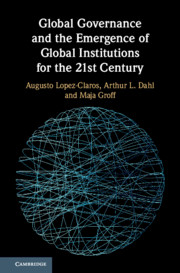“In this outstanding volume, López-Claros, Dahl, and Groff document the existential challenges facing our global institutions, from environmental decline and the failure of existing international security mechanisms to mass population flows and the crisis of sovereignty and civil society engagement. The resulting landscape might seem hopeless and overwhelming, if not for the authors’ innovative, wide-ranging, and thought-provoking recommendations for reshaping existing institutions to expand their relevance and effectiveness. Their ideas for updating our seven-decades-old structures include creating an international peace force, ratifying a United Nations Bill of Rights, reforming the UN Security Council and International Monetary Fund, establishing a civil society chamber, and beyond. Readers may not endorse every one of their suggestions, but they are invited into a fascinating game of ‘what if?’ and ‘why not?’ It is an invitation that should not be missed.”
“The current UN-based world system of governance, largely formulated in the mid-20th century after the Second World War, is not up to dealing satisfactorily with 21st-century problems. But it is what we have. The authors of this book suggest radical, even breathtaking, reforms to enable global governance to cope with current and prospective global problems, from keeping and enforcing peace, to inhibiting – if not preventing – financial crises, to protecting residents of all countries from governmental abuse, to mitigating and adapting to climate change. These are desirable objectives, not yet feasible in a world of nationalistic states devoted to narrow national sovereignty. But political leaders eventually die, and the authors take comfort that today’s youth, tomorrow’s leaders, are much more conscious of today’s global problems. This book provides an illuminating and provoking starting point for expanding our institutional ability to solve them.”
“López-Claros, Dahl, and Groff propose radical reforms to the charter that authorizes and rules the United Nations, and other methods of improving the current muddled state of global governance. Their case is persuasive. This book’s trenchant analysis of what ails the running of the globe should be read by policymakers everywhere, and certainly by those many citizens who concern themselves with fostering a better and more functional world. Change comes slowly, but this book is a prodding catalyst.”
“The bold idealism championed by López-Claros, Dahl, and Groff is just what the planet needs, with not a moment to lose if we are to halt and reverse the trajectory of imminent disaster on which we have set ourselves. As a former Ambassador to the United Nations with first-hand experience on the UN Security Council, I applaud the vision laid out for transformational change grounded in past institutional experience.”
“Global Governance is a book of exceptional breadth and vision, written for an unprecedented period in the historical evolution of humankind. Defying the cynicism and myopia that often define the political culture of our times, it dares to state the obvious truth that global interdependence is an inescapable reality, and that, far from naïve idealism, building effective global institutions in the 21st century is a matter of survival for our species.”
“This volume makes a powerful call for action to transform the international institutions that govern human affairs. Grounded in rigorous historical exploration, it offers a vision for collective courage to change what we can and reimagine what we consider outmoded and inadequate. This is the blueprint for a new global architecture.”
“This pathbreaking work provides important insights for practitioners and scholars struggling to understand the economic, political, and scientific forces roiling the world. As humanity seeks ways, well beyond the traditional controls available to individual nation states, to manage problems which pose enormous risks as well as rich opportunities, this book points in promising directions.”
“From the vantage of where we sit today, it is difficult to recall – or even imagine – the confidence in global institutions that characterized the last decade of the 20th century. Consider a few of the highlights: the entry into force of NAFTA in 1994 and creation of the World Trade Organization in 1995; establishment of the International Criminal Tribunal for the Former Yugoslavia and the International Criminal Tribunal for Rwanda in 1993 and 1994; and the Maastricht Treaty’s significant advances in the institutionalization of Europe in 1992. Even the U.N. Security Council was somehow on the rise, with the coalition it empowered to undertake the first Gulf War in 1990. In reading this important new work on global governance, one cannot help but recall those heady days. Rather than mere nostalgia, however, what López-Claros, Dahl and Groff offer is a firm normative account of the wisdom of that era – and of the perhaps even more pressing need for such institutionalist imperatives today. Equally important, they offer a thoughtful blueprint for a re-invigorated international order and suggest why that ambitious vision – far from mere pious hope – is well within reach.”

